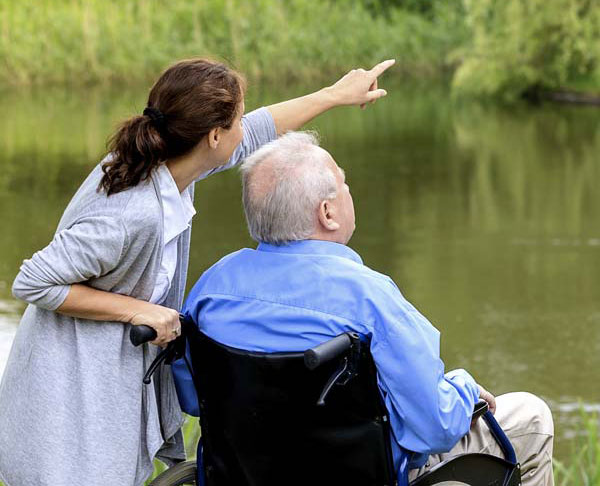Services
Home Caregiving
Whether you're caring for your loved one from down the street or across the country, we can help. Our non-medical homecare services allow your loved one to safely remain at home as long as possible. We are available for as many hours a day as you need, up to live-in care. We have someone on call to assist you 24 hours a day, 7 days a week with your scheduling needs.
Frequently Asked Questions About Homecare
Is home care covered by health insurance, Medicare or Medicaid?
Certain services of home health care are covered by part B of Medicare. Some individuals may qualify for Medicaid assistance. Most non skilled, companion homecare services are not covered by Medicare or insurances. Coverage can be covered by long term care insurance and private pay.
What training does your staff complete?
Innovative Healthcare caregivers are trained in accordance with state licensing rules and regulations. All employees who work with us have a minimum of one year of certifiable experience, are registered with the state of CA as home care aides, DMV checks, TB testing, fingerprinting, have provided satisfactory references prior to employment and are fully insured and bonded. Staff members are committed to serving each person with respect and care.
What type of assistance do we need?
Families and friends assume an incredible amount of responsibility when caring for an aging loved one. Family and friends can usually help for a short time, but extended care takes the expertise and commitment of knowledgeable professionals. As you and your family members continue to evaluate the level of care you or your loved one need, consider some of the following activities and whether you or your family member in question can independently manage these responsibilities. If the answer is no, this can also serve as an indicator of when you or your loved one may need home care. A number of options are available for finding help at home. It is often best to start by assessing your personal needs, or your needs as a caregiver and the needs of the person you are caring for.
Consider the following areas:
- Personal Care: Assistance is needed with dressing, bathing and taking medications.
- Household Care: Help with grocery shopping, cooking, cleaning or doing laundry.
- Health Care: Make medical appointments and drive to the doctor and drugstore. Meet with doctors, care managers and assist others to understand what care is needed.
Manage crises or develop care plans for sick family members. You need or regularly help transfer someone in and out of bed, assistance with physical therapy, injections, feeding tubes or other medical procedures. You are or need a designated "on-call" family member for problems. - Emotional Care: You need or provide transportation, comfort and companionship for your loved ones.
Home care services should be tailored to meet each person’s unique needs.When selecting home care services, the list below can assist in understanding a person’s behavior and help you determine the type of care needed, while still providing them with independence and dignity.
Consider issues with:
- Managing finances: Are bills being paid late or being forgotten altogether?
- Errands: Are running simple errands, such as grocery shopping, doctor appointments or a trip to pick up prescriptions at the pharmacy becoming a challenge?
- Post surgery: Managing even the simplest daily activities after coming home from the hospital after surgery can be a challenge.
- Memory loss/Dementia: A gradual or sudden loss of memory and language skills may result in evasive answers in an attempt to cover the inability to remember words, places and people.
- Diminished hearing: Your loved ones don’t always answer the phone or takes a long time to pick up when you call… even though they’d always answered with no problems before.
- Diminished sight: Is your loved one experiencing falls? Have you noticed a hesitance in his or her walk?
- Falls: Unexplained bruises, often accompanied by explanations for cuts, bruises or broken bones that don’t ring true.
- Incontinence: Clothing stains; odors emanating from furniture, clothing or automobile seats.
- Self neglect: Poor eating habits and inadequate nutrition/hydration; failure or inability to follow through on physician’s instructions, medicine dosages, etc.
- Won’t bathe: It could simply be that they are afraid or not able to get into the bath and are too embarrassed to ask for help.
- Resists doing things that he/she always liked: Such as playing cards, singing or dancing. This could be a sign of depression, or a sign that the capability to do these activities is slipping. The inability to do what they used to do can trigger depression.
- Won’t get out of bed: This could be a sign that they don’t feel well, but can also be a symptom of depression.
- Won’t take his/her medicine: They might be experiencing some side effects to a medication. Check with the doctor or a pharmacist as to what the possible side effects are of the medicine they are resisting and then check for these side effects.
- Makes excuses not to attend family or other special events they used to enjoy: Investigate if there is something about the physical environment that bothers them – too much noise, harsh smells or whether the temperature is too hot or cold.
For all these reasons the CARE MANAGER can be the one individual who guides and coordinates all the care components and helps family stay involved, at whatever level is appropriate for each family. Contact us to learn more >




